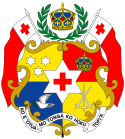
The history of Tonga is recorded since the ninth century BC, when seafarers associated with the Lapita diaspora first settled the islands which now make up the Kingdom of Tonga. Along with Fiji and Samoa, the area served as a gateway into the rest of the Pacific region known as Polynesia. Ancient Tongan mythologies recorded by early European explorers report the islands of 'Ata and Tongatapu as the first islands having been hauled to the surface from the deep ocean by Maui.

George Tupou I, originally known as Tāufaʻāhau I, was the first king of modern Tonga. He adopted the name Siaosi, the Tongan equivalent of George, after King George III of the United Kingdom, when he was baptized in 1831. His nickname was Lopa-ukamea, meaning iron cable.

The Legislative Assembly of Tonga is the unicameral legislature of Tonga.

General elections were held in Tonga on 23 and 24 April 2008 to elect members of the Legislative Assembly. The nobles were elected on 23 April, and the nine people's representatives on 24 April. A total of 32,000 people turned out to vote, giving a turnout of 48%.

Early general elections under a new electoral law were held in Tonga on 25 November 2010. They determined the composition of the 2010 Tongan Legislative Assembly.

The Cabinet of Tonga is the cabinet of the government of the Kingdom of Tonga. It is composed primarily of the ministers of government. The latter, including the Prime Minister, are appointed by the monarch. The Governor of Ha'apai and the Governor of Vava'u also serve on the Cabinet ex officio. When in session and presided over by the monarch, the Cabinet is known as the Privy Council.
Sione Teisina Fuko is a Tongan politician and former Member of the Tongan Parliament for the island of Ha'apai. He is a member of the People's Democratic Party.

Samiu Kuita Vaipulu is a Tongan politician and Cabinet Minister. He was the Deputy Prime Minister from 2010 to 2014 and is currently Minister for Trade and Economic Development. He most recently served as the Acting Prime Minister of Tonga from December 2024 to January 2025.
ʻEtuate Lavulavu is a Tongan politician and former member of the Legislative Assembly of Tonga for Vavaʻu. He was stripped of his seat in 2016 after being convicted of bribery, precipitating the 2016 Vavaʻu 16 by-election. He graduated with a Bachelor of Arts from Brigham Young University–Hawaii followed by a Master of Arts from Brigham Young University in Utah. He publicly claimed to have a PhD from the University of Edenvale, a US diploma mill, and began referring to himself as "Professor".

Dr. Viliami Uasike Latu is a Tongan politician and Cabinet Minister.
Vavaʻu is an electoral constituency which sends two representatives to the Legislative Assembly of Tonga. It covers the eponymous region and island chain.

Fatafehi Fakafānua, known before ascending to his title as Fatafehi Kinikinilau Lolomana‘ia Fakafānua, is a Tongan politician, Lord of the Realm and the Speaker of the Tongan Legislative Assembly. He is the 8th Lord Fakafānua.

General elections were held in Tonga on 27 November 2014. All twenty-six elected seats in the single-chamber Legislative Assembly were up for election, although the monarch, acting on the advice of his Prime Minister, retains the possibility to appoint members to Cabinet from outside Parliament, thus granting them a non-elected ex officio seat in Parliament.

General elections were held in Tonga on 16 November 2017 to elect 17 of the 26 seats to the Legislative Assembly. King Tupou VI dissolved the Assembly on 25 August 2017 on the advice of its Speaker, Sialeʻataongo Tuʻivakanō, who claimed that Prime Minister ʻAkilisi Pohiva was attempting to claim powers held by the King and Privy Council within Cabinet.

General elections were held in Tonga in 1930.

General elections were held in Tonga in May 1948.

General elections were held in Tonga on 27 May 1963.

General elections were held in Tonga in May 1969.

General elections were held in Tonga in 1951
Harry Percival Vete was a Tongan businessman, politician, and member of the Legislative Assembly of Tonga. He was an early member of the Church of Jesus Christ of Latter-day Saints in Tonga.










